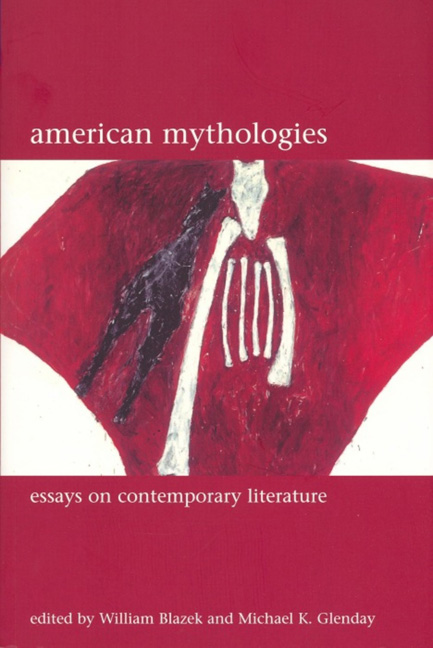Book contents
- Frontmatter
- Dedication
- Contents
- Acknowledgements
- Introduction
- 1 Indians with Voices: Revisiting Savagism and Civilization
- 2 Wild Hope: Love, Money and Mythic Identity in the Novels of Louise Erdrich
- 3 Float Like a Butterfly, Sting Like a Bee: Mythologies of Representation in Selected Writings on Boxing by Norman Mailer
- 4 The Secret Sharing: Myth and Memory in the Writing of Jayne Anne Phillips
- 5 The Individual's Ghost: Towards a New Mythology of the Postmodern
- 6 ‘Cheap, On Sale, American Dream': Contemporary Asian American Women Writers’ Responses to American Success Mythologies
- 7 ‘No Way Back Forever’: American Western Myth in Cormac McCarthy's Border Trilogy
- 8 Native American Visions of Apocalypse: Prophecy and Protest in the Fiction of Leslie Marmon Silko and Gerald Vizenor
- 9 The Brave New World of Computing in Post-war American Science Fiction
- 10 Mythologies of ‘Ecstatic immersion’: America, The Poem and the Ethics of Lyric in Jorie Graham and Lisa Jarnot
- 11 Whose Myth is it Anyway? Coyote in the Poetry of Gary Snyder and Simon J. Ortiz
- 12 Aging, Anxious and Apocalyptic: Baseball's Myths for the Millennium
- 13 Finding a Voice, Telling a Story: Constructing Communal Identity in Contemporary American Women's Writing
- Notes on Contributors
- Index
13 - Finding a Voice, Telling a Story: Constructing Communal Identity in Contemporary American Women's Writing
- Frontmatter
- Dedication
- Contents
- Acknowledgements
- Introduction
- 1 Indians with Voices: Revisiting Savagism and Civilization
- 2 Wild Hope: Love, Money and Mythic Identity in the Novels of Louise Erdrich
- 3 Float Like a Butterfly, Sting Like a Bee: Mythologies of Representation in Selected Writings on Boxing by Norman Mailer
- 4 The Secret Sharing: Myth and Memory in the Writing of Jayne Anne Phillips
- 5 The Individual's Ghost: Towards a New Mythology of the Postmodern
- 6 ‘Cheap, On Sale, American Dream': Contemporary Asian American Women Writers’ Responses to American Success Mythologies
- 7 ‘No Way Back Forever’: American Western Myth in Cormac McCarthy's Border Trilogy
- 8 Native American Visions of Apocalypse: Prophecy and Protest in the Fiction of Leslie Marmon Silko and Gerald Vizenor
- 9 The Brave New World of Computing in Post-war American Science Fiction
- 10 Mythologies of ‘Ecstatic immersion’: America, The Poem and the Ethics of Lyric in Jorie Graham and Lisa Jarnot
- 11 Whose Myth is it Anyway? Coyote in the Poetry of Gary Snyder and Simon J. Ortiz
- 12 Aging, Anxious and Apocalyptic: Baseball's Myths for the Millennium
- 13 Finding a Voice, Telling a Story: Constructing Communal Identity in Contemporary American Women's Writing
- Notes on Contributors
- Index
Summary
Willa Cather, in her 1925 introduction to Sarah Orne Jewett's collected stories, repeatedly uses the metaphor of voice to praise the Maine writer's work:
Pater said that every truly great drama must, in the end, linger in the reader's mind as a sort of ballad. Probably the same thing might be said of every great story. It must leave in the mind of the sensitive reader an intangible residuum of pleasure; a cadence, a quality of voice that is exclusively the writer's own, individual, unique. (8)
In her comments about Jewett's fiction, Cather says that ‘good writing’ possesses ‘the kind of beauty we feel when a beautiful song is sung by a beautiful voice that is exactly suited to the song’ (8). Cather's own novel, The Song of the Lark (1915), dramatizes the difficulties of this process when the singer (and by extension, the writer) happens to be American, and a woman. It also dramatizes the rewards. About her character, Thea Kronberg, Cather's narrator states: ‘Her voice, more than any other part of her, had to do with that confidence, that sense of wholeness and inner well-being that she had felt at moments ever since she could remember’ (196).
If Cather's character finds her voice in the German operatic repertoire, the contemporary women writers whom I discuss in this essay describe a more basic process. Voice is still a central metaphor, but its significance is now less personal than political. Instead of the ‘individual, unique’ voice that Cather celebrates, contemporary American women writers tend to foreground the politics of cultural identity. They aim to speak for cultural communities, and they create characters who struggle to do so. Toni Morrison, Leslie Silko, Maxine Hong Kingston, Sandra Cisneros, and other contemporary women writers describe the processes whereby their characters eventually find a voice that recuperates (or creates) a shared understanding of their own history and culture. So, then, the ‘sense of wholeness and the inner well-being’ that Cather's character experiences are, in these contemporary novels, also described in terms of finding one's voice.
- Type
- Chapter
- Information
- American MythologiesNew Essays on Contemporary Literature, pp. 267 - 294Publisher: Liverpool University PressPrint publication year: 2005



